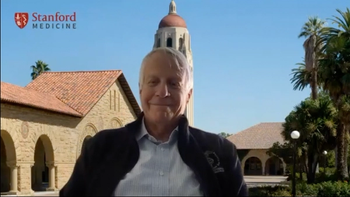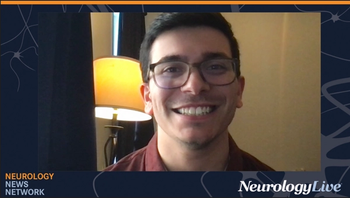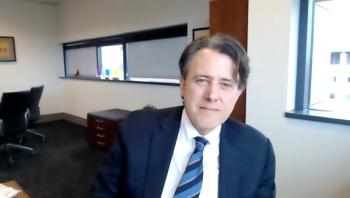
"Mind Moments," a podcast from NeurologyLive, brings you an exclusive interview with Stephen Krieger, MD.

"Mind Moments," a podcast from NeurologyLive, brings you an exclusive interview with Stephen Krieger, MD.

Deborah Miller, PhD, commented on strategies to maintain patient-provider communication following the discontinuation of disease-modifying therapies in MS.

The founder of First Coast Integrative Medicine spoke on a 6-week virtual program that introduced IM modalities, including guided journaling, nutrition, and yoga. [WATCH TIME: 3 minutes]

Ashish Pradhan, MD, the executive director and disease area lead for MS and NMOSD, Genentech, offered insight on a number of presentations at the 2021 ECTRIMS Congress.

Discussing this year’s virtual ECTRIMS conference, the Zimmermann Professor of Neurology and Neurological Sciences, and Pediatrics at Stanford University provided his opinion on recent developments in the MS field. [WATCH TIME: 3 minutes]

The Zimmermann Professor of Neurology and Neurological Sciences, and Pediatrics at Stanford University discussed the treatment’s potential in the multiple sclerosis space, where there are other competing drugs with similar safety profiles. [WATCH TIME: 4 minutes]

Megan Weigel, DNP, APRN-C, APHN-C, MSCN, discussed findings from a study of integrative medicine via a virtual, 6-week workshop, which produced varied results.

After showing potential remyelination effects, the director of the Multiple Sclerosis Center at Ochsner Health offered her perspective on the latest data for ATA188 in progressive MS. [WATCH TIME: 4 minutes]

The professor of neurology at the NYU Grossman School of Medicine discussed the trial design of VIOLA, a new prospective study evaluating responses to COVID-19 vaccines in patients with MS on ocrelizumab (Ocrevus; Genentech). [WATCH TIME: 3 minutes]

In the final day’s plenary session at ECTRIMS Congress, Ruth Ann Marrie, MD, PhD, FRCPC, FCAHS, gave a look into some of the notable presentations from the annual meeting.

An indirect comparison study evaluated relative treatment effects of eculizumab (Soliris; Alexion), inebilizumab (Uplizna; Horizon), and satralizumab (Enspryng; Genentech), the 3 FDA-approved options for NMOSD.

The workshop included weekly virtual meetings on journaling, meditation, yoga therapeutics, among other activities.

Neurology News Network for the week ending October 15, 2021. [WATCH TIME: 3 minutes]

Investigators concluded that treatment with high-efficacy disease-modifying therapies was a protective factor in disease prognosis.

The Zimmermann Professor of Neurology and Neurological Sciences, and Pediatrics at Stanford University spoke on the safety and efficacy of ublituximab in treating patients with relapsing forms of multiple sclerosis. [WATCH TIME: 4 minutes]

Data presented at the ECTRIMS Congress 2021 noted immunity was reduced in patients taking anti-CD20 monoclonal antibodies.

The director of the Multiple Sclerosis Center at Ochsner Health discussed the open-label extension data presented at ECTRIMS Congress on ATA188 in progressive MS. [WATCH TIME: 4 minutes]

The vast majority of patients with MS, 63.4%, who initiated ofatumumab treatment in the 6 months after its approval had mild disability, while only 29.2% had moderate disability and 7.4% had severe disability.

The treatment effect observed from nabiximols (Sativex; GW Pharmaceuticals) was significant at all 1-week time points over the course of the 12-week study.

Lawrence Steinman, MD, Zimmermann Professor of Neurology and Neurological Sciences, and Pediatrics at Stanford University, discussed findings presented at ECTRIMS 2021.

Data from the EXPAND trial show that after 12 months of treatment, changes on retinal nerve fiber layer thickness favored those on siponimod rather than the placebo group.

The director of the Mellen Center for MS Treatment and Research at Cleveland Clinic provided context on whether efficacy outcomes should be weighed more than mechanistic action when evaluating MSC-NTF cell therapies. [WATCH TIME: 3 minutes]

In addition to the data presented at ECTRIMS Congress 2021, Atara Bio is investigating the therapy in an ongoing and enrolling phase 2 study, EMBOLD (NCT03283826), which is expected to read out interim results in early 2022.

After vaccination, patients showed no increased risk of relapse activity, but had varied immune response depending on the disease-modifying therapy they were treated with.

Investigators found that Hispanic and African American patients had an increased risk of developing ambulatory disability, when compared to Caucasian patients with MS.

In data presented at ECTRIMS 2021, from years 1-5, the proportions of patients with relapsing multiple sclerosis achieving NEDA-3 status ranged from 63%to 75%.

The director of the Mellen Center for MS Treatment and Research at Cleveland Clinic discussed the use of MSC-NTF cells in progressive MS and the data backing this approach. [WATCH TIME: 3 minutes]

The chair of the department of neurology at The Ohio State University spoke to the ongoing conversation in MS about how aggressive to be with treatment early on.

The chair of the department of neurology at The Ohio State University discussed the idea of the multiple sclerosis prodrome, presented in a plenary address at the MS Virtual 2020 meeting.

The chair of the department of neurology at The Ohio State University discussed some of the main themes and takeaways from the MS Virtual 2020 meeting.